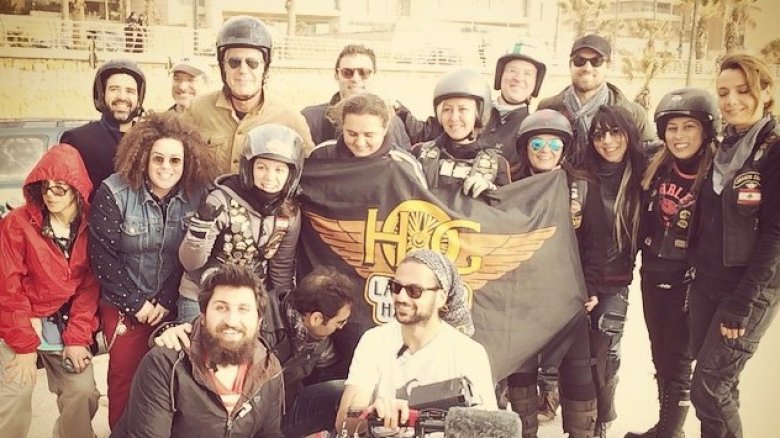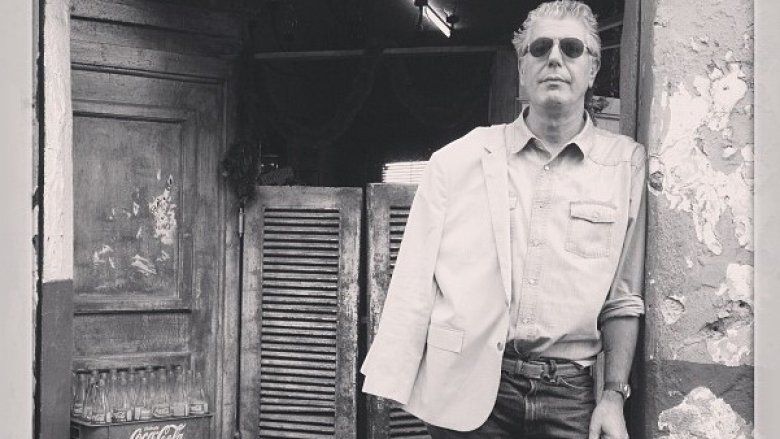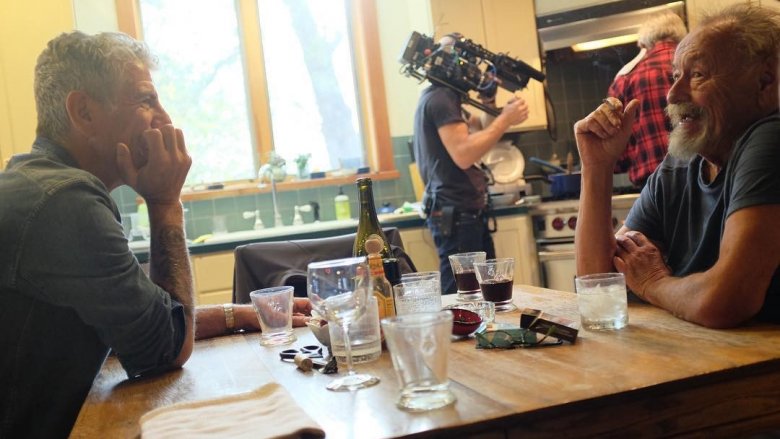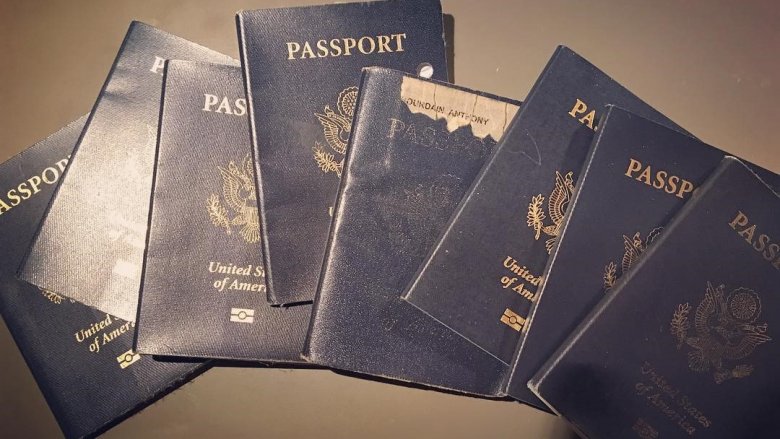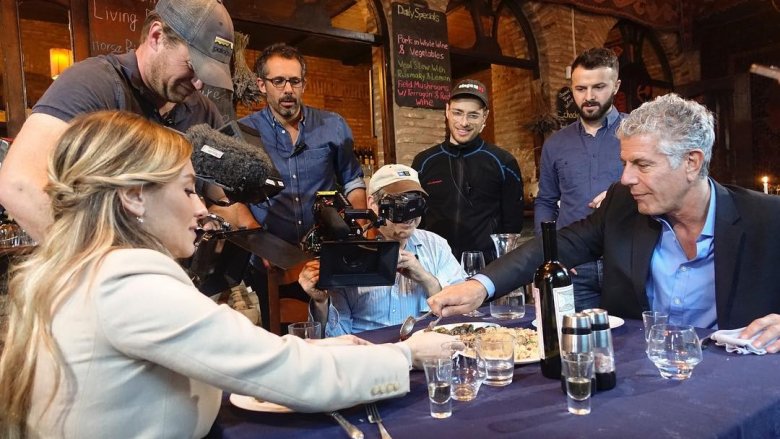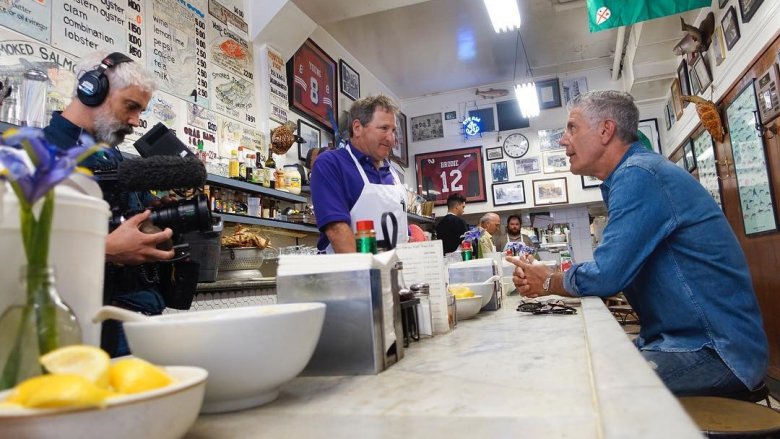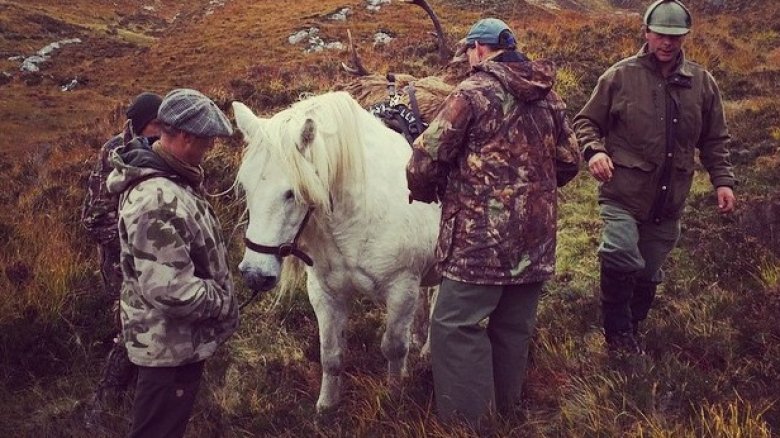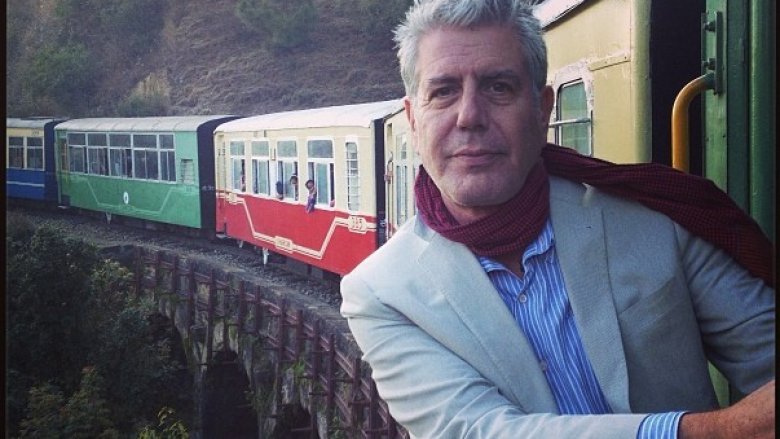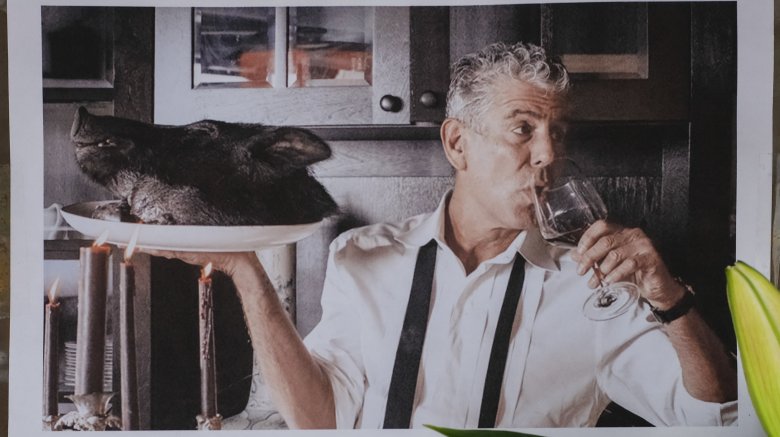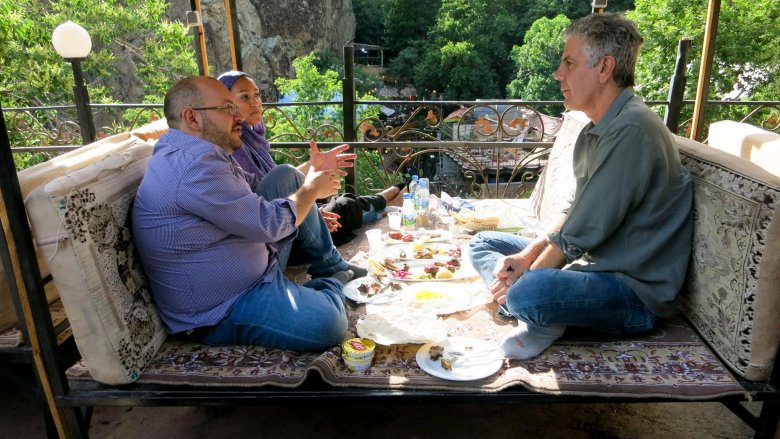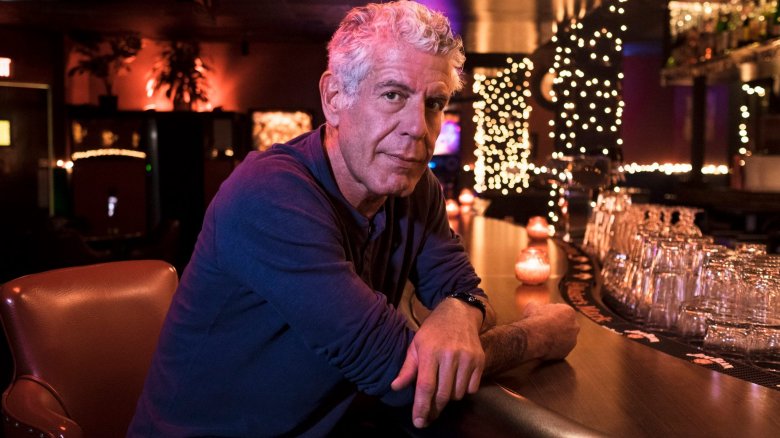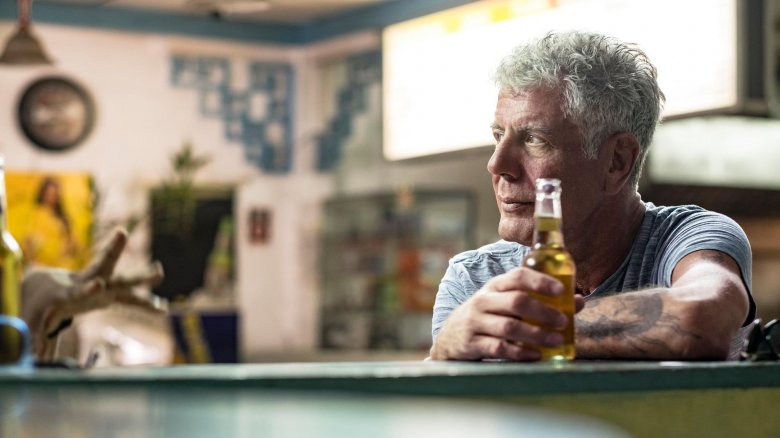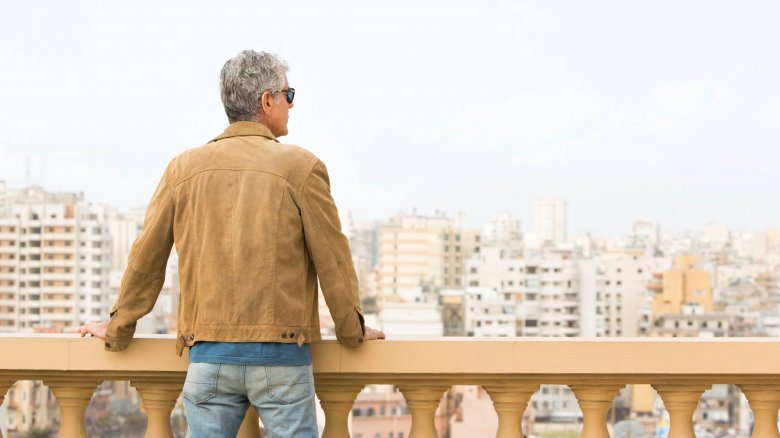The Untold Truth Of Anthony Bourdain: Parts Unknown
There are cooking shows and travel shows, and then there is Anthony Bourdain: Parts Unknown. While most travel shows might hit the most popular destinations in the world, Bourdain and his small crew went in the complete opposite direction. They took their cameras to the places no one else was exploring — some you had probably never even heard of — and along the way, they met some incredible people, tried a lot of amazing food, and uncovered some truly moving stories.
Armenia. Myanmar. Tanzania. Beirut. Borneo. While most people would be hard-pressed to find these places on a map, Bourdain made it a point to not only introduce his fans and foodie followers to the cuisine and culture of these oft-overlooked lands, but also to humanize the faces behind the headlines. Parts Unknown showed us things we didn't know about our global neighbors, so let's talk about what you don't know about the show.
It started with Lebanon
Hear reference to Beirut and Lebanon, and you think of a place torn apart by relentless war and strife. Bourdain saw something else: "It's a beautiful city, with layers of scars the locals have ceased to even notice. It's a place with tremendous heart... It defies logic. It defies expectations. It is amazing."
He was there in 2006 for No Reservations, and so was Kim Ghattas. Then a BBC correspondent, Ghattas says (via The Atlantic) it was something of a turning point not just for the country, but for Bourdain. It was there that he decided to start telling the stories of the people he saw behind the front lines, those just trying to get on with their lives against a terrifying backdrop of conflict. The seeds of Parts Unknown were planted, and it's why Bourdain later decided to visit places like Gaza, Libya, Cuba, and Haiti.
CNN highlighted just how much of an impact Beirut had, saying not only did it change the way Bourdain did television, but on a personal level, he had considered naming his daughter after the city. Without Beirut, there would have been no Parts Unknown.
The show helped a jailed journalist
In 2014, Bourdain interviewed Washington Post reporter Jason Rezaian and his wife, journalist Yeganeh Salehi, for an episode on Iran. It was only a few weeks later that CNN reported both journalists had been arrested, and while Salehi was released quickly, Rezaian spent the next two years in jail facing espionage charges.
Bourdain continued to advocate for him during his confinement, and he was ultimately released as part of a prisoner exchange. Rezaian later lauded Bourdain for putting a face to those who were struggling against oppression, and credits the interview he did for Parts Unknown as opening the door that allowed other news outlets to cover his detainment.
He also credited Bourdain with helping him through the difficulties that came with having to adapt to life as a free man, saying it was only with his professional and personal friendship that they were able to get through the ordeal. Later, he agreed to tell his entire story with Bourdain's encouragement and help — Rezaian's book was, from the beginning, destined to be published by Bourdain's little corner of HarperCollins Publishing.
The crew took part in everything
What you see on the screen is always only about half the story, and that's extra true for Parts Unknown. When People sat down with Bourdain in early 2018, he gave a behind-the-scenes look at filming that makes it even more impressive.
There are only seven people responsible for filming: Bourdain himself, and his crew. Since each episode was filmed over the course of 10 days, that meant every minute — from meals to travel — needed to be scheduled by the producer. And that could be tricky, because those big meals needed to be broken up over separate days. There was never any script, they never filmed two cities without getting a break in between, and best of all? It wasn't just Bourdain who was drinking, it was everyone.
In order to put everyone at ease and help people get over the fact there was a camera crew in their midst, everyone would join in the drinking, the carousing, the conversation. The goal was, said Bourdain, that "Everyone should think of these crew guys as, at worst, an annoying relative with a camera. Not as an invading army from outside." And it worked.
It involved even more travel than you thhink
Bourdain and his crew were on the road for an average of 250 days a year, and he told People that all the travel and time away from home only helped to solidify the small Parts Unknown crew into a "dysfunctional family." While it's impossible to tell just how many miles they've covered, consider this: in 2018, Bourdain was working on filling his 12th passport.
That's a mind-blowing amount of traveling, but there were some places that stood out. When National Geographic asked Bourdain about some of his favorite places, he gave some interesting answers. Tokyo, he said, was the city that had it all, Uruguay and Argentina were the most underestimated destinations, Spain hosted his most memorable dining experience, Iran was the most surprising, Sardinia was the place he'd love to live, and Vietnam was the place he would go "if everything went wrong in my life and I ended up alone and drinking too much."
Beer snobs hate the show
In 2016, the poncy side of the craft beer community took aim at Parts Unknown and Anthony Bourdain personally for what they perceived to be an egregious crime against their very belief system. When Bourdain stopped to talk to Thrillist about the "controversy," he said it was down to one simple difference in opinion. While beer snobs thought he should be drinking the beer they believed was the best in each country, Bourdain was down for whatever was nearby and cold.
In fact, Bourdain didn't pull any punches when he announced he wasn't about to turn Parts Unknown into a search for a city's greatest beer, either. He went as far as to say he thought that maniacal focus on beer quality, history, and tasting notes ruined what a bar was about. A bar should be a place to "have a good time," and when he wandered into a snobby brewpub, it all became clear. "This is wrong. This is not what a bar is about."
Parts Unknown was never going to be known for exploring wine, either — he also told Thrillist the winery and brewery scene was "...just not visually interesting."
He knew how important it was
Parts Unknown was never television for the sake of television. In 2016, Anthony Bourdain spoke with Business Insider about the show, and when they asked him if he was aware of the kind of influence he had the potential to have, he said he definitely was.
"I think primarily, I'm always looking to look at a place from a different perspective," he said, and went on to describe the choices he made for the show in the context of Rome: "... everyone's seen classic Rome and the Colosseum and the buildings of antiquity. So I said, let's look at a completely different side of Rome."
Along the way, he said he was also very aware that featuring a place on TV could change it forever. If he thought there was the possibility the publicity would ruin a little local hangout, they made the decision to film it in such a way it was impossible to find for anyone who didn't already know about it. "I don't want to hurt people. I don't want to change the world in a bad way..." he said.
The show was accused of animal cruelty
In 2015, thousands of animal lovers signed a petition to cancel Parts Unknown because of graphic images of animals being slaughtered. The petition specifically called out a few scenes, including the slow decapitation of a camel and the death throes of a deer. Those weren't the only scenes people had problems with, either. In 2016, Mercy for Animals condemned him for eating rabbit heads and describing a dish made by tearing out a living duck's intestines.
Last Chance for Animals also started a petition against Parts Unknown, for scenes like the one in Hawaii, where Bourdain started chewing on a live octopus in order to kill it. Supporters condemned him for not only showing the scenes, but for joking about the suffering he was catching on camera.
Bourdain responded to the complaints, and explained (via Eater), "Contrary to what some may say, I do not enjoy seeing the death of any living thing. I do not promote animal cruelty. But I think people should know where meat comes from, and knowing, they should feel free to decide what they do from there."
It had lasting impacts on Bourdain
There's no way to travel, to experience new countries, and to meet so many new people without being changed, and in 2016, Bourdain talked to Business Insider about some of the places that had surprised even him, a jaded traveler, writer, and host.
He told them the Philippines had a lasting impact on him, and even though he knew a bit about the nation's history and culture, he had still been surprised by what he found. "...this was a chance to learn about the Filipino character, and why so many of them end up as caregivers ... that instinct to give."
He also named Senegal and the Greek islands as places that surprised him, for their colonial history and for their ability to function under the shadow of a refugee crisis, respectively.
And, of course, Lebanon. Bourdain told National Geographic that he hoped to encourage people to visit, to explore, and to fall in love with the place like he had.
There's a reason he ate that crazy food
It's not Bizarre Foods, but Parts Unknown still does show Bourdain eating meals that would ruin the entire day for most people. If you've ever wondered how he manages to eat all that weird stuff, you're not alone. Business Insider asked him how he did it, and he had a pretty touching response.
"... people are being nice to us, they're giving us their hospitality. ... I may end up at grandma's house and I may not like grandma's turkey, but I'm sure as hell going to clean my plate and compliment her on it because it's her house. And that's a really important part of being a guest."
He added that's a huge part of what made the show work as well as it did. When people saw he and his crew were polite, appreciative, interested in their lives and their neighborhoods, and that they truly were grateful to be allowed to enter a very personal space, it gave them a rare insight that was reflected in what they caught on camera.
It made an entire region love him
Parts Unknown put the spotlight on countries all over the world, but according to CNN, the show truly endeared him to one specific region: the Middle East. He stopped in Lebanon, Iran, Israel, and Palestine, and for each show he was lauded for giving insights into the people living in some of the most conflicted areas in the world.
On Iran, he wrote of how warm and welcoming he found the people, "...in spite of the fact that you are standing in front of a giant, snarling mural that reads 'DEATH TO AMERICA!'..." In Jerusalem, he traced the history of falafel, sampled all kinds of hummus, and was later lauded for defining the people of the conflict as faces instead of numbers and statistics.
No one missed the fact that Parts Unknown served to humanize people whose homelands tend to be reported on in a very cold and clinical way, and Bourdain himself summed it up best, with this note about Iran: "This is not a black-and-white world — as much as people would like to portray it as such."
One episode may have had an important segment cut
Seattle seems like an odd choice, mixed in among more exotic destinations like Armenia and the Congo. Bourdain admitted (via his Field Notes) that he chose that particular city because of the music scene there, but like most episodes of Parts Unknown, it explored much more than just that one facet. And surprisingly, it was the Seattle episode that made some people very unhappy.
One interview, with Nikki Barron of the nonprofit Techbridge Girls, an organization geared toward getting more women involved in math, science, and technology-related fields, never made it into the final show. It was heavy stuff, too, with a focus on sexual harassment in the tech industry. She was still featured in the show's montage, but SeattleMet reported that her interview was cut for reasons never fully explained.
There was another problem, too. One of the segments that was left in was an interview with VR adult films company MiKandi, and Barron says she never knew about it. Their inclusion in the show was enough for Barron to refuse to do it, making it all the more problematic that images of her were left in the montage.
One episode featured his depression
Bourdain seemed to have it all, including a life that made almost everyone jealous. But one 2016 episode of Parts Unknown hinted that all was not well, and it was an episode filmed in Argentina. He wrote in an essay for CNN: "One odd and endearing feature of Argentina is how common it is to see a psychologist or psychiatrist. It seems nearly everyone's got one. So I saw one too. So welcome to the dark crannies of my skull."
Throughout the episode, viewers got a glimpse into Bourdain's sessions with a therapist, where he talked about recurring dreams filled with a sense of hopelessness and desperation, feeling alone and isolated, and on depression that would last for days. It was such a dark episode, Eater even started their review with, "Should we be worried about Anthony Bourdain's mental health?"
In his CNN essay, Bourdain apologized for the use of his therapy sessions as a way to frame the episode, but did finish with the fact he was extremely proud of the way it turned out. In hindsight, it's an eerie episode indeed.
He had no plans to retire
You might think that after visiting so many places and traveling so much, Anthony Bourdain would have been looking forward to wrapping up his time on Parts Unknown and a change to the quiet life. But he spoke with People less than a month before his death, and said he had no plans to retire or to end the show. Some of the episodes hadn't even aired yet, and while he did say he always enjoyed the days he spent at home with his daughter and girlfriend — and noted that he especially loved the sound of doing laundry — he had no plans to quit the show.
"I just think I'm too nervous, neurotic, driven. I would have had a different answer a few years ago. I might have deluded myself into thinking that I'd be happy in a hammock or gardening. But no, I'm quite sure I can't. I'm going to pretty much die in the saddle."
If you or anyone you know is having suicidal thoughts, please call the National Suicide Prevention Lifeline at 1-800-273-TALK (8255).
